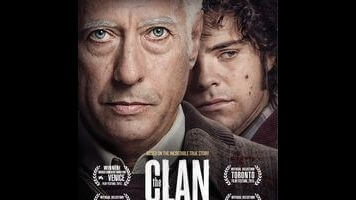Argentinian smash The Clan makes an interesting true story look generic

Nothing says respectable like a good, solid family business. The Clan, a middling drama that set an opening-weekend box-office record in Argentina last August, revolves around the real-life Puccios, a tight-knit family of seven who in the 1980s lived above their corner storefront in the San Isidro neighborhood of Buenos Aires. But all the members of the middle-class household look the other way when it comes to the nasty enterprise that actually has them upwardly mobile: Patriarch Arquímedes (Guillermo Francella), who helped disappear dissidents as an intelligence officer for the recently fallen military dictatorship, has adapted his expertise to put some ransom money into his own coffers. And he even drafts one of his sons, well-known national-team rugby player Alejandro (Peter Lanzani), as his right-hand man in the kidnapping scheme.
This extortion racket—which flourishes between 1983 and 1985, as Argentina begins its transition back to democracy—also happens to operate out of the home. Early on, Clan director Pablo Trapero (who also co-wrote the script for his eighth feature with Julian Loyola and Esteban Student) smoothly underscores the uncomfortable proximity of the grisly business to dinner-and-homework domestic life: The camera follows Arquímedes as he carries a tray, bearing some scraps from a chicken carcass, up the stairs, past wife and children, to feed the bound-and-gagged captive writhing around in the bathroom. (This knocking is audible every step of the way.) Trapero—who with cinematographer Julían Apezteguia also choreographs a couple impressive long-take abductions, as well as a genuine stunner of a final follow shot—often demonstrates his technical mastery here. But as a storyteller, he’s unfortunately less successful.
Ripping off Martin Scorsese rip-offs by relying on a jukebox of ironic pop (led by The Kinks’ “Sunny Afternoon,” which was itself a bona fide oldie by the mid-’80s), Trapero spends too much time documenting the rise of the Puccio criminal empire, rather than simply staying focused on the curious family dynamics underwriting it. Francella, a popular comedian who also co-starred in the original Secret In Their Eyes, gives a terrific piercing-gaze performance as the quietly domineering Arquímedes. But the younger Lanzani, who doesn’t offer much more than a winning smile, eventually eclipses him in terms of screen time. Lanzani’s “Alex,” as he’s most frequently identified in the subtitles, goes with the flow a little too readily to make for a suitable audience surrogate, as he’s quite clearly intended to be: Even after Arquímedes captures and kills one his rugby teammates, the golden-boy middle son still doesn’t hesitate to help Dad with his dirty work. And it’s only once things take off with love interest Mónica (Stefanía Koessl) that Alex seems to have any second thoughts about what he’s taking part in. The Clan does pick up in its courthouse final act, delving more deeply into the question of the family’s broader blind-eye complicity, but by this point the film as a whole can’t be saved. It’s already succumbed to a few too many crime-saga clichés.